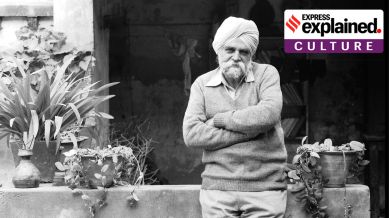Remembering Gursharan Singh, who took theatre to the rural masses of Punjab
The writer, director, actor, and political activist, fondly remembered as Gursharan Bhaji by his admirers, passed away on September 27, 2011. Agitating farmers invoked him, and his plays with a conscience inspired Punjabi youths over four decades. Here's why he is such an important figure in the world of theatre.

Gursharan Singh, popular as Bhai Manna Singh and Gursharan Bhaji, was the man who took theatre to the streets and villages of Punjab. September 27, the date on which he passed away at the age of 82 in 2011, is observed as Revolutionary Theatre Day.
On this day, the contributions of Gursharan Singh, writer, director, actor, and political activist, is remembered gratefully by all those whose lives he touched and influenced.
Family and life journey
In September 1975, during the Emergency, Gursharan Singh lost his job as a hydraulic engineer, but was reinstated in August 1977 after the lifting of the Emergency and the formation of the Janata Party government.
However, he took premature retirement in 1982 and, after a few years, moved with his family to live in Chandigarh, where he continued to stage plays.
In 1981, he had formed the Punjab Lok Sabhyacharak Manch (PLSM) along with a group of like-minded people. Several groups are currently part of this umbrella organisation. Through the decades from the 1970s to the 2000s, he inspired many young men and women to take up theatre.
The slight that lit a fire
Gursharan Singh completed an M Sc in technical chemistry and moved to Nangal in 1951 to work as a hydraulic expert with the Bhakra Beas Management Board.
In 1958, Prime Minister Jawaharlal Nehru visited the dam site in the company of visiting dignitaries from the Soviet Union. A cultural evening was organised in their honour. Gursharan Singh requested the management to allow the workers at the site to watch the rehearsal for the show. He was snubbed — he was told that workers did not understand fine culture.
Gursharan Singh was stung by the rebuff. He decided to take theatre to rural Punjab, so that audiences there could be introduced to the nuances of stage performances.
In 1964, he founded the Amritsar Natak Kala Academy and introduced world drama to audiences in that city. From 1969 onward, he started to take his plays to villages. It was Gursharan Singh more than anyone else who created an audience for theatre in Punjab.
Performing amid fields
Fans and followers of Gursharan Singh say that he performed in the villages of Punjab on at least 150 nights in a year. Men, women, and children came in large numbers to watch his plays, riding tractor-trolleys, bicycles, and bullock carts, and even on foot. They raised funds for theatre, and invited him to perform in their villages.
Gursharan Singh believed that the rural citizens of India were denied exposure to cultural expression and modern sensibilities. A number of writers and theatre directors would refuse to travel to rural areas in the belief that village audiences did not understand the language of theatre; the massive response to Gursharan Singh’s plays proved them wrong.
In the 1970s, he performed in the villages, producing theatre that was rooted in the lived experience of rural folk, and to which they could relate to easily. Gursharan Singh’s theatre was not reliant on fancy stage equipment, lighting, or auditoriums in order to be attractive to its audience.
Plays with a conscience
Gursharan Singh wrote more than 200 plays, which were published in 17 books. Some of his plays were translated into English and Hindi as well. He was a recipient of the Sangeet Natak Akademi Award.
Gursharan Singh’s plays had a strong social message. He spoke for women, Dalits, and the landless through his plays. He worked for equality and people’s rights all his life. In September 1976, during the Emergency, he was arrested because the government disapproved of
the plays that he staged.
His popular plays in the early 1980s were ‘Baba Bolda Hai’, ‘Ek Kursi Ek Morcha Te Hawa Vich Latakde Log’, ‘Chandigarh Puare di Jarr’, etc. ‘Hit List’ was his daring play during militancy in Punjab.
Gursharan Singh also worked in a few Punjabi films, including ‘Man Jeete Jag Jeet’, ‘Mutiyar’ and ‘Soorma Bhagat’. He played the role of Bhai Manna Singh in the popular Punjabi TV drama of the same name on DD Punjabi, which earned him his popular name.
Legacy of Gursharan
During the agitation against the farm laws, protesting farmers observed his birthday on September 16 at various protest sites in Punjab and on the border of Delhi.
“From September 16-27, we continuously staged plays remembering Gursharan Bhaji at different protest sites in 2021. He is remembered on various occasions every year, and specially in September,” Narain Dutt from Inqlaabi Manch Punjab told The Indian Express.
Kanwaljeet Khanna, general secretary of PLSM, said: “Every year between September 16 and September 27, we organise various programs to remember the legend who was an institution by himself. We organise plays, kavi darbars, and various events across the state to remember him.”
Khanna said that on Friday, Gursharan Singh’s 13th death anniversary, PLSM will organise a program in Barnala which would be attended by his two daughters. “The entire body of Gursharan Bhaji’s work has been digitised. We cannot forget his contribution to the world of theatre,” Khanna said.